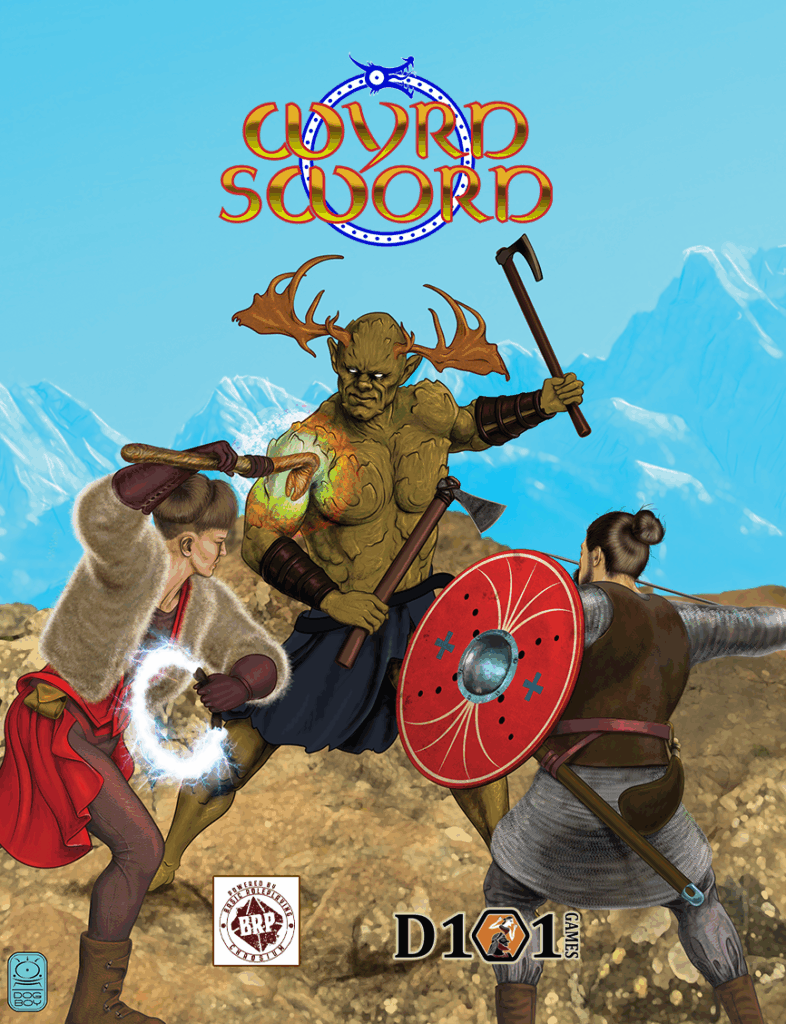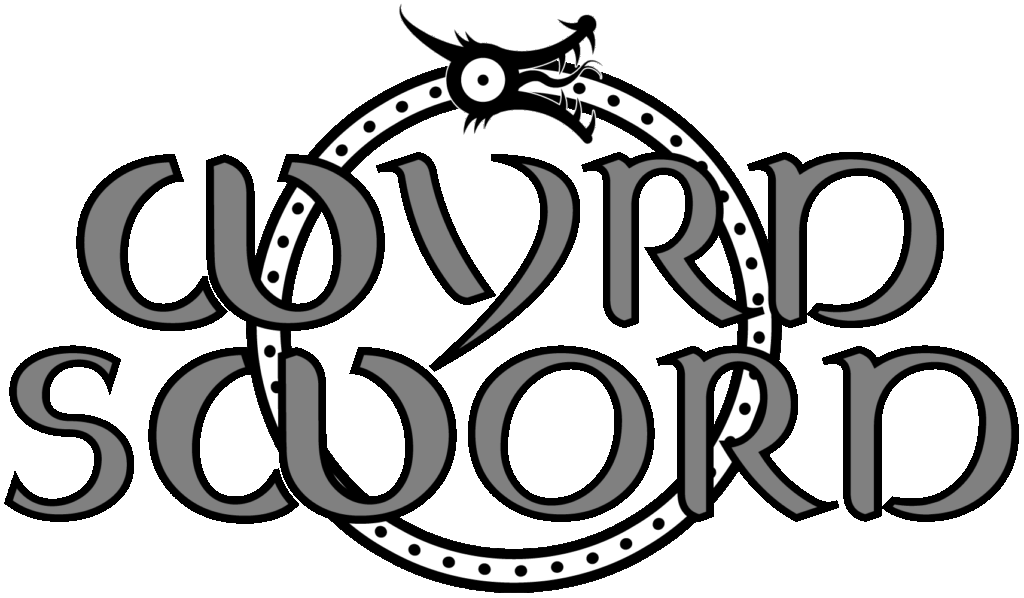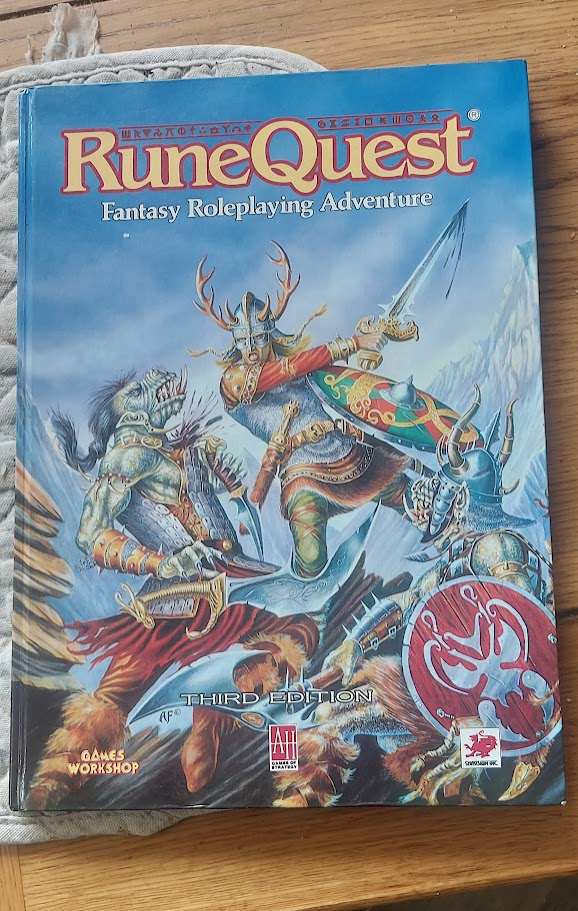Mad excitement this morning as Dan Barker completed and delivered his cover for the game


UPDATE 16/08/2025. I’ve now closed the application process, since I’ve got enough playtest GMs.Thanks to everyone who joined up. I’ll be in touch early next week with the current draft of the rules, to get things started 🙂
External playtest of Wyrd Sword, my BRP based fantasy game, is now open. I’m looking for GMs with groups to play the game and provide feedback. There’s a signup form here.
The basics of the game are as follows.
More about the game in detail, comparing it to BRUGE from which it was developed, in the following document.

There are also the following blog posts about the game in more detail.
Note: If your are an OpenQuest fan worried that I’m abandoning OQ for this, don’t. Legacy is very much a one off self-contained book, it should give you all the tools to run a very focused BRP fantasy game. Also, it’s a very different play experience, so while I’ve had a really fun time playtesting it, it’s in a way deepened my appreciation for the very different style and experience OpenQuest brings to the gaming table
Note II. This is the game I’ve been previously calling Legacy. When I opened the external playtest someone kindly pointed out that there was another game called Legacy, and futher research revealled there was at least two, with numerous games with names like Legacy of… or … Legacy. So a quick rename was in order.
Following on from my soft-reveal ( see What I did on my Summer Holiday’s Part 2), I’ve been quietly busy working on Legacy, my BRP Fantasy game.

I started an Internatl Playtest back in March. Mainly this has been overwhelmingly fun, gradually introducing the new rules to two players both verterans from the RQ3 days. Much to my surprise bringng back alot of the things I dropped from OpenQuest for Legacy, in redone streamlined way, such as hit locations, tick box experience, specials, and fumble tables has actually works and is fun in play. Legacy is crunchy like honey nut cornflakes – morishly tasty and without the irritating bits.
I decided to redevelop the Magic System, egged on by Adrian Smith, one of my playtesters, who is playing the Magican Joan De Dimeter. This has been a complete upgrade of the BRP Magic system, whose origins lie in the Worlds of Wonder box set first published in the early 80s. The overall goal is to make BRP magic more interesting, flexible and powerful. And I’m happy to say that after a thorough rewrite, it does that. The number of spells has grown from about 30 in BRUGE to 51 in Legacy, with 38 reusable magic powers being the basis of them. No more will the players look at a spell and feel slightly underwhelmed at its power. Now competant Magicians with Magic Casting over 50% have the option to step up their Duration, Range, number of Targets, scale up the effects of the spell, by spending additional magic points. They can even create new spells from the powers they already know from spells in their character’s grimoire (spell book) or research new ones from dusty arcane libraries. Players who feel intimidated by the idea of making up spells and changing properties on the fly, can simply use the Spell List of 50+ spells, and ask other players and the GM to work out how to tweak spells on the odd occasion that they want to do that.
Ritual Magic has its own chapter and Enchant, Summon, Ceremony skills are back, after RQ3, streamlined and self-contained. Perhaps not for the causal player who want to cast spells and forget it, but it opens up whole more considered options for advanced magicans.
Finally, to balance out the powers system and give warrior types something to play with, there’s a whole chapter on…
MARTIAL ARTS
Not just those that take inspiration from Hong Kong action movies, but also inspired by Hollywood films of the 40s-50s like Douglas Fairbanks Jr./Errol Flynn’s Robin Hood, and Kirk Douglas’ The Vikings. Seven Martial Arts styles are detailed, each with a set of core benefits that activate when the Martial Arts skill is successfully rolled, and a set of Techniques, which are special moves and attacks that the character selects as they increase their Martial Arts skill.
Did I mention my character has the Axe Throwing Technique?
The idea with Martial Arts was to give veteran fighters a power system all of their own, to advance through as magicians gain more magic. A bunch of fun options to spice up combat and make it more cinematically fast-moving. While we are in the early stages of playtesting, intial signs are good.
[This post was originally made back in September of last year, after a family Summer holiday in North Norfolk, see part 1.]
This is a sort of “soft launch” of something I’ve hinted I’ve been working on for BRP previously.
So I took my laptop with me, mainly to game/stream in the evening, but also to do some writing if the family allowed it – which they did, now that everyone is hooked to their phones/devices! I made a deal with myself that I was only going to do fun RPG writing, rather than stuff that is “get it damn well finished!” :
Previously, when I last had a holiday during Easter break, I had a good tinker with the BRP-ORC SRD (aka the entire text of Basic Roleplaying Universal Game Engine). The aim was to get a straightforward Fantasy-BRP game out it. Well, I’ve been fiddling with the embryonic game that emerged from those writing sessions on and off. Despite my reservations, it started shipping up to something I enjoy writing. So this became a light, fun project over my recent family holiday in North Norfolk. I got up early and got set for the day (ie. did my dad duties around the cottage), and then while the family had a sleep in I would work on the document. Go out for the day, and once everyone had settled for the evening, write up whatever my brain had come up with in the background during the day.
My design process has been roughly the following for the game, which has the working title Legacy.

1. Take the base of RuneQuest 3 – which, minus the three Gloranthan magic systems is in BRUGE – much to my delight, and bash it into the same length and scope as the old Games Workshop core RQ3 book, which was my first serious entry point into BRP back in the late 80s. In fact here its.

Note that Legacy is not an RQ clone, despite the SRD it developed from having much of the text. It’s more of a what-if project: “What if we take core RQ3 and develop it so it’s easier to play and supports sandbox-style play out of the box?”
2. Make character generation fun. It’s now a seven-step process, with a final eighth step that gets the players to consider how their characters met and formed their adventuring company. Skills remain the focus, and players gain them through from the following sources.
Equipment is picked up from that listed under the profession, and everyone gets a Family Heirloom, a minor magical item with its own Wyrd.
3. Every character is a champion with a Wyrd (or destiny). This sets the character out from the stay-at-home folks, and in-game terms allows rerolls and bonuses to various rolls upon spending Wyrd Points. It’s a modernising touch, and one that should make the characters more epic than their Old School BRP ancestors.
4. Only Magicians have magic. The Magic chapter is but one, alongside Combat, and there is one magic system (BRUGE’s Magic, more or less as is, with enough extra spells to support the game’s five Magician Professions)
5. Streamline systems while still keeping it BRP. So gone is the Resistance table, and resistance rolls are now a subset of characteristic rolls modified by difficulty. So for example a POT 20 poison vs a character with CON 15 would be a Difficult Stamina roll to resist. I’ve also standardised the criticals and specials chance table into a much shorter table where they are listed by competency.
6. Fun Combat. Yes, hit locations are back because I miss them from my 90s RQ3 days (and remember, BRUGE is a lot of RQ3). As is the DEX initiative model of BRP inherited from early editions of Call of Cthulhu is one I know works for me. Not that hated strike ranks are available via BRUGE – because that would allow people to make RQ clones. All the fumble tables have been condensed into one and all those wacky roll again once/twice/three times results that get oh so boring in play have new results. Also the “you hit nearest friend” results. Because no one really wants that :). Overall aim is to make BRP combat as quick and smooth as I’ve done with OpenQuest but without gutting what people see as BRP (so specials are still there)
7, Sandbox adventure creation. Don’t get me wrong, I love the guided scene-by-scene or location-based adventures I write for OpenQuest, but there’s time when I wish I could just turn up for game night with a page of bullet points, all the important monsters statted up, and a couple of random tables to support improvised play. So, this is the route I’m taking here.
8. There is an implied setting, The Realm. This is the character’s civilisation surrounded on all sides by hostile borderlands, beyond which are hostile nations and even wilderness ravaged by the Warp, an chaotic mutating power that occasionally intrudes into reality, leaving destruction in its wake. The players and the GM discover and fill out details during play. Guidance on how is currently earmarked to go in the unwritten GM’s Guidance chapter and peppered throughout the rules.
Lastly, I kept the following two questions and answers in mind while hacking away at the rules.
Does this mean I’m throwing OpenQuest or Sky Pirates under the bus? Heck no, I love OQ and have fun playing it regularly on OpenQuest Thursday game nights, during my regular Empire of Gatan campaign. Sky Pirates is still happening. Most of it is written but may be pipped to the post by Legacy, simply because I’ve already happily got the art for it.
Ultimately, why am I doing this? This scratches a different itch of D100 gaming. The need as a longtime BRP fan to have a quick plug-and-play version of Fantasy BRP, based on my nostalgia for my very early experiences with RQ3 before it got cluttered and frankly very confused with all the options in the Advanced RQ3 book that Games Workshop brought out a couple of months after the core book. Where I just drew a map, made up a few monsters, called some mates round who quickly generated characters, and boom had a series of happy afternoons of carefree adventuring with no grand meta-plot lurking in the background. BRP unleashed and supported the players’ creativity, used to the restraints of D&D.
Update: the above was a snapshot of where I was with Legacy in September 2024. I put it to one side once my holidays ended and didn’t pick it up again until Christmas. Since then I have steadily been working on it on and off since then. It’s now at the point where it’s being internally playtested, has a logo courtesy of Dan Barker, and is being polished up for a public playtest, possibly leading into a Kickstarter in early summer. However, my internal playtest has thrown up many changes. The biggest one is a complete rewrite of the game’s magic system, making it more flexible and, dare I say it, free-form, yet still familiar to old hands. I know that’s a big aim, but that’s where I’m going with it. Overall, the game is rapidly evolving into its own thing, without ceasing to be BRP. I’m playing OpenQuest online in the same week-cycle as my Legacy playtest, and while they both share the same roll under D100 skill mechanic, they are very different games, which is very satisfying. I’ll post a more formal announcement when the game goes into public playtest.